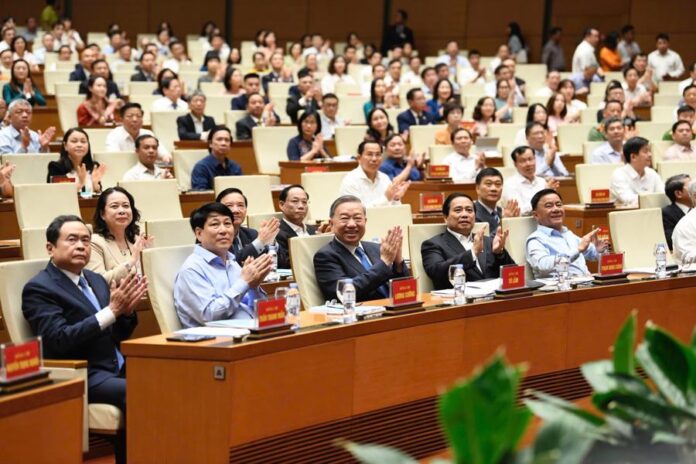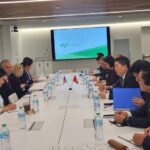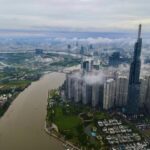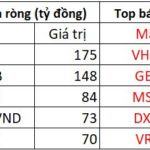On the morning of May 18, the Politburo and the Secretariat organized a national conference to propagate and implement Resolution No. 66-NQ/TW, dated April 30, 2025, of the Politburo on innovating the work of building and enforcing laws to meet the requirements of national development in the new era, and Resolution No. 68-NQ/TW, dated May 4, 2025, of the Politburo on developing the private economy.
At the conference, Comrade Pham Minh Chinh, Politburo member, Prime Minister, presented a topic on the key and core contents of Resolution No. 68-NQ/TW, dated May 4, 2025, of the Politburo on developing the private economy and the Government’s Action Plan to implement the Resolution.
First of all, the Prime Minister emphasized that Resolution 68 was built and promulgated very quickly under the direction of General Secretary To Lam. Within 13 days of the promulgation of Resolution 68, the National Assembly and the Government issued 3 resolutions to institutionalize and deploy it. This shows the timely, rapid but also thoughtful preparation, with a very urgent and serious working spirit, under the direction and attention of the Politburo and the General Secretary.
The Prime Minister focused on presenting 5 main contents: (1) Overview of the private economic sector; (2) The core contents of Resolution No. 68-NQ/TW of the Politburo; (3) The main contents of Resolution No. 138/NQ-CP dated May 16, 2025 of the Government on issuing the Government’s Action Plan; (4) The main contents of Resolution No. 198/2025/QH15 dated May 17, 2025 of the National Assembly on some special mechanisms and policies to develop the private economy and Resolution No. 139/NQ-CP dated May 17, 2025 of the Government on the Plan to deploy Resolution No. 198/2025/QH15 of the National Assembly; (5) Organization of implementation.
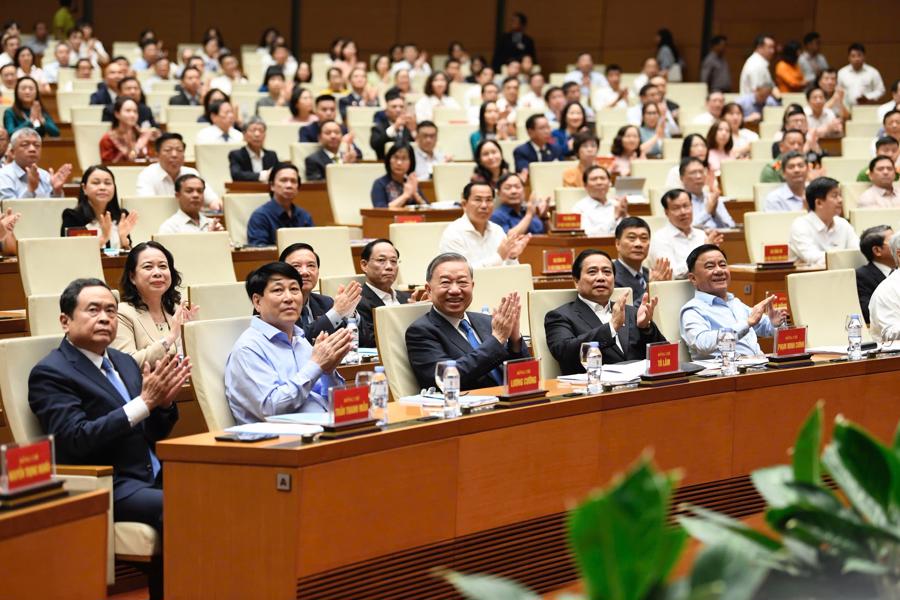
THE PRIVATE SECTOR PLAYS AN INCREASINGLY IMPORTANT ROLE
Regarding the overview of the private economic sector, the Prime Minister said that in the nearly 40 years since the Renovation, the views, guidelines, policies and laws of the Party and State on the private economy have been clearly reflected in the documents of the Party Congresses, the resolutions of the Party Central Committee and the Politburo, the Laws, Resolutions of the National Assembly, and the Decrees and Resolutions of the Government concretizing the Party’s guidelines on developing the private economy.
The Sixth Party Congress (1986) affirmed the existence of the private economy associated with the multi-sector economy, including the clear direction to “use private capitalist economy in some industries and trades.”
The Seventh Party Congress (1991) allowed the private economy to “develop without limitation in scale and scope of operation in industries and trades that are not prohibited by law.”
The Eighth Party Congress (1996) recognized the role of the private economy, stating that “private capitalist economy has the potential to contribute to national construction.”
The Ninth Party Congress (2001) had a more open view of the private economy: “encourage the development of private capitalist economy on a large scale in production and business sectors that are not prohibited by law.”
The Tenth Party Congress (2006) determined the important role of the private economy and required: removing all barriers, creating a favorable business environment for all types of private enterprises to develop without limitation of scale in all sectors and fields that are not prohibited by law.
The Eleventh Party Congress (2011) clearly defined the role and position of the private economy and required “improving mechanisms and policies to strongly develop the private economy, making it one of the driving forces of the economy.”
The Twelfth Party Congress (2016) and The Thirteenth Party Congress (2021) affirmed and emphasized “improving mechanisms and policies to encourage and facilitate the strong development of the private economy in most industries and fields, becoming an important driving force of the economy.”
The Prime Minister said that the Party Central Committee and the Politburo have issued many guidelines and policies on the development of the private economy, notably Resolution No. 14-NQ/TW dated March 18, 2002 of the 5th Plenum of the 9th Party Central Committee “On continuing to renew the mechanism, policy, encouraging and creating conditions for the development of the private economy”; Resolution No. 10-NQ/TW dated June 3, 2017 of the 5th Plenum of the 12th Party Central Committee on “Developing the private economy into an important driving force of the socialist-oriented market economy”; Resolution No. 41-NQ/TW dated October 10, 2023 of the Politburo on “Building and promoting the role of the Vietnamese business community in the new period.”
From 2017 up to now, the Government has submitted to the National Assembly for the promulgation of nearly 60 laws, more than 40 resolutions and ordinances, and 17 new-generation free trade agreements; the Government has issued about 1,000 decrees related to the private economy.
In the period of 2021 up to now, the private economic sector has faced many difficulties due to the impact of the Covid-19 pandemic, slow global economic recovery, and hidden risks. The Government has submitted to the National Assembly and the Standing Committee of the National Assembly for the promulgation of many policies and solutions to support businesses, cooperatives, business households, and employees. Support policies for businesses are very timely and relatively comprehensive, including policies on reducing, extending, and postponing taxes, fees, charges, land rent, debt rescheduling, and debt freezing…
At the same time, the Government has issued many projects, programs, and plans related to the development of the private economy in various fields (typically the Project on developing human resources for digital transformation; the Program to support private enterprises in sustainable business; the National Trade Promotion Program, the Program to support the development of supporting industries…)
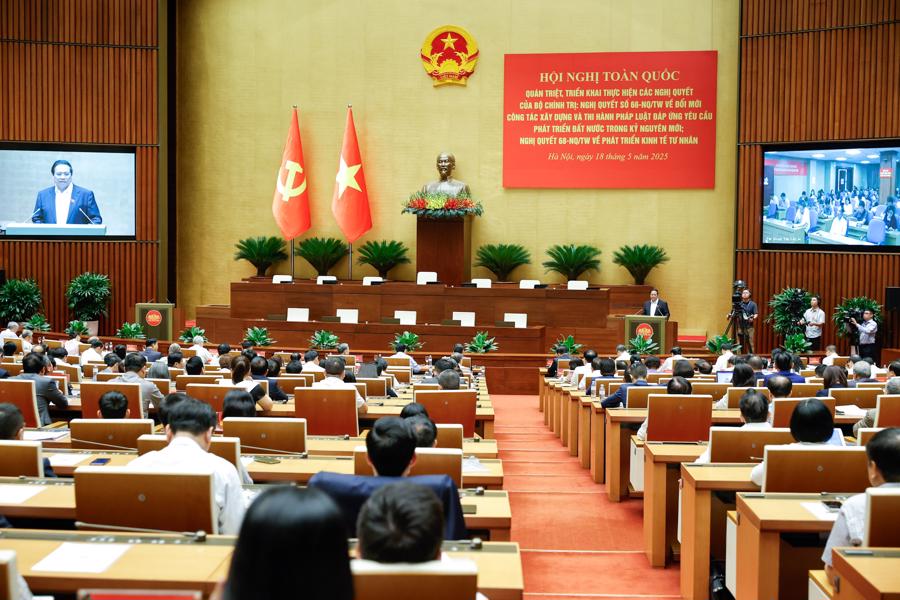
Regarding the results achieved, the Prime Minister evaluated that the development process of the private economic sector in nearly 40 years can be summarized in 5 phases:
(1) Phase 1986 – 1999: Formation and recognition;
(2) Phase 2000 – 2005: Brilliant with the Enterprise Law;
(3) Phase 2006 – 2015: Integration and expansion;
(4) Phase 2016 – 2024: Start-up explosion and an important driving force for economic development;
(5) Phase from 2025 onwards: Orienting the development of the private economy to become the most important driving force of the national economy.
Specifically, the Prime Minister said that the number of newly established enterprises increased rapidly, from about 5,000 enterprises in 1990 to 50,000 enterprises in 2000, and 200,000 in 2005 (40 times higher after 15 years); up to now, there are nearly 1 million enterprises operating in the economy.
The private economy has continuously maintained a fairly high growth rate, being the sector with the largest contribution in the economy, accounting for about 50% of GDP. From 2016 up to now, the growth rate of the private economic sector has reached about 6-8%/year, higher than the average growth rate of the economy.
The private economic sector makes a very important contribution to job creation, promoting economic restructuring, especially in rural and difficult areas. In the period of 2017-2024, the private economic sector employed an average of more than 43.5 million laborers, accounting for more than 82% of the total number of employed laborers in the economy.
The proportion of investment capital of the private economy in the total social investment capital increased rapidly, from 44% in 2010 to 56% in 2024; contributing more than 30% of the total state budget revenue, about 30% of the total import and export turnover.
The private economy is a dynamic sector in technology renovation, product and service innovation. Innovative start-up enterprises increased rapidly, from 1,500 start-ups in 2015 to about 4,000 start-ups in 2024. Many large corporations and enterprises are forming and developing, reaching out to the region and the world.
The team of entrepreneurs is growing stronger, the business spirit, the innovation spirit, and the aspiration to rise are getting stronger and stronger; especially, even in difficult times, natural disasters, and epidemics, enterprises and entrepreneurs still strive to maintain production and business activities, showing social responsibility to the community.
Along with the important contributions, the private economic sector still has limitations and shortcomings. The goal of developing the private economy set out in Resolution 10-NQ/TW in 2017 (reaching 1.5 million enterprises and contributing 55% of GDP by 2025) has not yet been achieved.
Nearly 98% of private enterprises are small and medium-sized enterprises (SMEs), and super-small enterprises (nearly 70% are super-small in scale), with limited competitiveness, operational efficiency, and management skills; labor productivity is lower than that of FDI enterprises and state-owned enterprises; the rate of private enterprises participating in the supply chain of FDI enterprises is low (only about 21%).
The average rate of operating enterprises reached about 10 enterprises/1,000 people in 2024, lower than that of countries in the region. The rate of enterprises withdrawing from the market increased, reflecting the situation of difficulties due to unfavorable fluctuations in the international and domestic situation.
Access to resources is still difficult, especially in terms of finance, credit, land, and high-quality human resources, especially for SMEs (accounting for nearly 98% of the number of enterprises but accessing less than 20% of total credit outstanding). Private enterprises account for less than 10% of the total market capitalization.
The connection between private enterprises, between private enterprises and state-owned enterprises and FDI enterprises is still limited (only 18% of enterprises have global value chain connectivity, of which large enterprises account for up to 62%, and the rest are small and medium-sized enterprises).
A part of private enterprises do not seriously comply with the law, information is not transparent, lack of strategic vision; business ethics and culture are limited (unfair competition, producing fake and poor-quality goods, violating contracts…). Some private enterprises are also involved in smuggling, tax evasion, market manipulation, hoarding, and price gouging…
Through the leadership, direction, and administration, the Prime Minister pointed out the fundamental shortcomings: The perception of the private economy is still limited, the view is not open; the leadership and direction are inadequate; the implementation of laws, mechanisms, and policies on the private economy is not really timely and effective; a part of private enterprises are not really proactive, flexible, self-reliant, and self-reliant, striving to rise.

Analyzing the causes of the limitations and shortcomings, the Prime Minister said that Vietnam is still a developing country, the economy is in transition, the economic scale is still modest, and the resilience is limited. Institutions and laws are still the “bottleneck of the bottleneck”. Administrative procedures are still cumbersome; Vietnam’s business environment index in 2023 ranked 70/190 countries, lower than some countries in the region.
Some unnecessary business conditions, impractical, have not been abolished or amended in a timely manner; investment and business procedures in some sectors and fields are still complicated and lack of transparency; some support policies for private enterprises are difficult to implement (such as support for research and development investment, tax incentives, and encouragement of business households to transform into enterprises…)
The internal capacity of the private economy is still limited, especially in terms of capital, governance, application of science and technology, digital transformation, and application of new business models such as green economy, digital economy, and circular economy.
The thinking and perception of a part of cadres and civil servants still carry the “give-and-take” mentality; there are still irresponsible behaviors, harassment, collusion with negative acts, interest groups, corruption, and waste.
In short, the Prime Minister said that the development of the private economy still faces many difficulties due to subjective and objective reasons, but the subjective reason is the main one, from perception to orientation, organization, and implementation of the law, the issue of summing up and honoring the private economy… Although there have been many efforts, they are still not commensurate with the potential and development of the private economy and not up to our expectations.
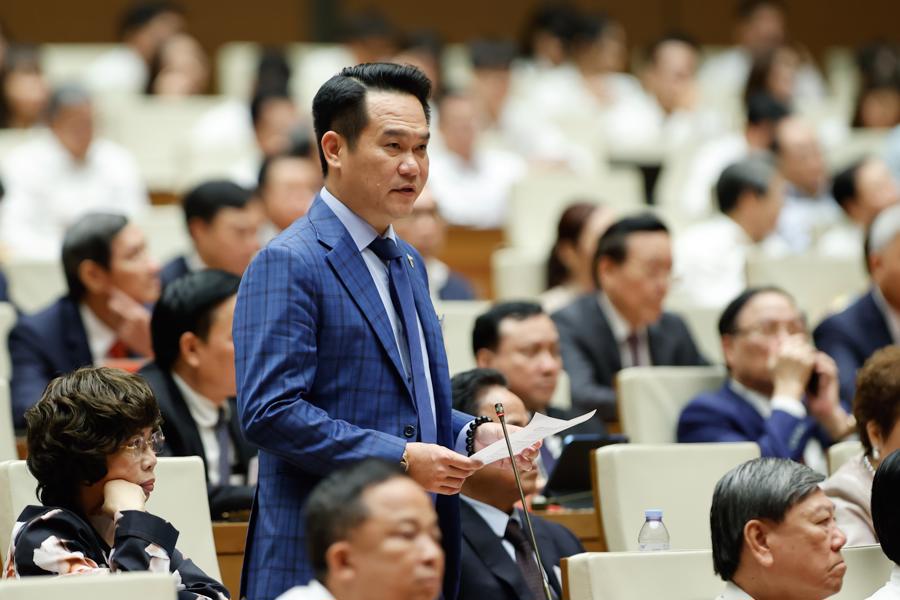
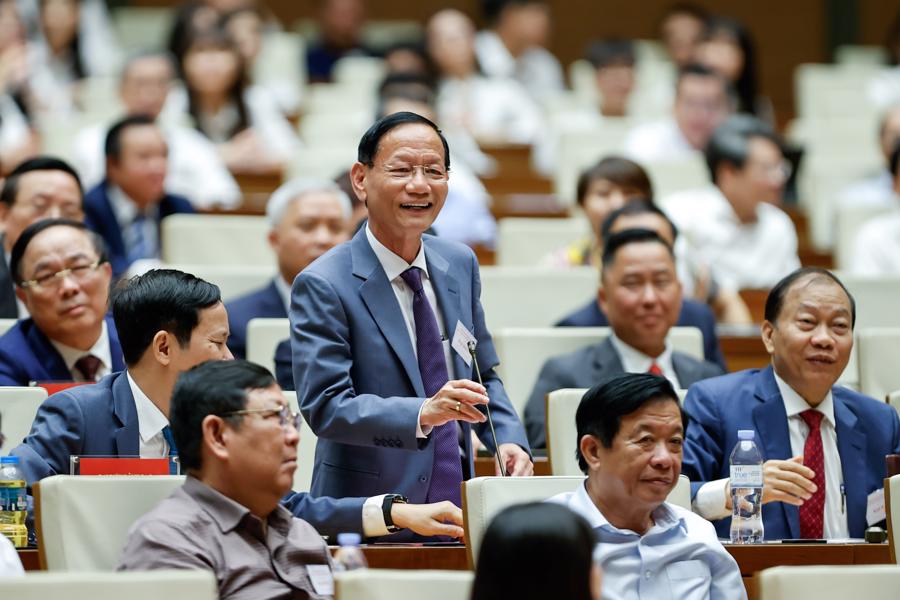
Drawing on the reality of the development of the private economy in our country in recent years and international experience, the Prime Minister drew some lessons.
First, renew thinking, unify the perception of the position and role of the private economy as the most important driving force and the main pillar of the national economy, create high consensus in society and strong actions to support the development of the private economy.
Second, enhance the role of the State in creating, leading, and directing, strengthen the capacity of leadership, direction, and administration, build institutions and organization of implementation, have breakthrough mechanisms and policies, remove all barriers, and the mentality of “if it cannot be controlled, it will be prohibited” to develop the private economy, promote cooperation between the State and the private sector.
Third, ensure that the private economy is treated fairly and equally with other economic sectors; have superior and breakthrough mechanisms and policies to unblock, mobilize, and effectively use resources, especially for research and development, innovation, and digital transformation; promote the reduction and simplification of administrative procedures and costs.
Fourth, give priority and support to large enterprises that are pioneers in leading some key and important industries and fields; strongly promote the connection between domestic enterprises and FDI enterprises; support private enterprises to expand their presence in the international market and build international brands.
Fifth, focus on training and developing high-quality human resources, have superior policies to attract talents, especially in high-tech fields and new industries, creating a driving force to strongly promote the development of the private economy.

Failure to Embrace Circular Economy Will See Logistics Businesses Left Behind
If logistics companies fail to embrace green practices and adopt a circular economic model, they risk facing significant challenges and falling behind in the global supply chain. The time to act is now, or businesses will face the consequences and struggle to keep up with the evolving demands of the industry.
The Great Egg Conundrum: Unscrambling the Facts
Recently, social media has been abuzz with videos and images showcasing seemingly unusual characteristics in certain chicken eggs, such as double yolks, watery whites, and abnormally shiny shells. These anomalies have sparked concerns among consumers about the quality of eggs available in the market.
“The Central Coast’s Tourism Hub: Sun Group’s Iconic Project Receives a Boost with a $2 Billion Investment”
The project encompasses a diverse range of developments, including commercial, tourism, and service sectors. With over 7,000 hotel rooms, an array of entertainment options, two additional cable car routes bringing the total to ten, along with supporting infrastructure and transportation hubs, this project is set to become a vibrant and exciting destination.


























